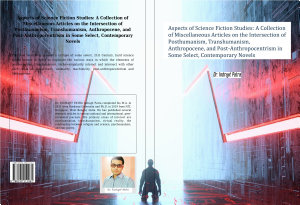Aspects of Science Fiction Studies: A Collection of Miscellaneous Articles on the Intersection of Posthumanism, Transhumanism, Anthropocene, and Post-Anthropocentrism in Some Select, Contemporary Novels
About this ebook
in order to explicate the various ways in which the elements of posthumanism, transhumanism,
techno-singularity intersect and interact with other such ideas as monstrosity, animality,
machinicity, post-anthropocentrism, and Anthropocene. The study divides its analysis into
seven different chapters and attempts to present an elaborate study on various aspects of
posthumanism, transhumanism, and singularity. The book despite being a collection of
miscellaneous essays actually intends to show how a technologically mediated
transhuman/posthuman culture will normally be defined by a total dissolution of binaries such
as digital and real, animal and human, and machine and man. The book also wants to describe
through its analysis of some select hard science fiction novels, that man-machine merger and
creation of hyper-immersive virtual reality can function as two of the most effective agents for
catalyzing a radically transformative, posthuman, post-scarcity, and techno-utopian culture. The
analysis presented in the book is not totally oriented to the discussion of far-future implications
of accelerated technological progress which is imperative for arriving at a transhuman or
posthuman stage; rather, the book is equally concerned with the implications of rapid
technological advancements in our present times, and so the study also posits that before
ascending to the heights of posthuman status mankind has to cope with the good and bad
aspects of the Anthropocene which is the next stage in our collective evolution and journey
towards the trans-/posthuman state. The first chapter of this study attempts to bring to focus the
phenomenon of a technologically-mediated dissolution of the binaries between man/animal, human/nonhuman, and subject/object which will be extremely important in the analysis of the
emergence of a posthuman culture later in the study. Technological advancements can be seen
here as either conducive towards creating a harmonious relationship between man and animal or
through systematic denigration of the agency of the animal it can pave the way for the
emergence of monstrosity. In Chapter 2 of the book, we shall delve deep into the analysis of
horror as illustrated in the novels and video games of the Dead Space series. Here, through a
multi-theoretical perspective, we shall find how horrors and monstrosity can manifest
themselves in both written as well as digital, virtual media. In Chapter 3, we shall delve into the
discussion of the power of simulation in the construction of an immersive and hyperreal post-
/transhuman culture where the distinction between real and virtual and material and immaterial
vanishes altogether. In Chapter 4 we dedicate the entire chapter to the study of Kim Stanley
Robinson’s systems novel The Ministry for the Future (2020) to attempt a critique of the
elements of good and bad Anthropocene. Though not directly and intimately related to the study
of posthumanism and transhumanism, yet a discussion of the elements of the Anthropocene will
be of immense contemporary relevance to us. The next Chapter, i.e., Chapter 5 will attempt to
present an explication of the role of machines in the realization of posthuman culture. Chapter 6
is primarily concerned with an analysis of Stephen Baxter’s novels to see how posthuman
culture is constructed around the agency of the autopoietic machines. The final chapter attempts
to present a brief analysis of three of Iain M Banks’ Culture novels, namely Matter, Surface
Detail, and Hydrogen Sonata to elaborate on the employment of posthuman/transhuman tropes
in these works.
About the author
Dr. Indrajit Patra completed his M.A. in 2011 from Burdwan University and
Ph.D. in 2019 from NIT, Durgapur, West Bengal, India. He has published
several research articles in various national and international, peer-reviewed
journals. His primary areas of interest are posthumanism, transhumanism,
virtual reality, the relationship between religion and science, psychoanalysis,
and epic poetry.




